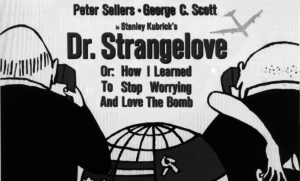 Today marks the 54th anniversary of the release of Dr. Strangelove Or: How I Learned to Stop Worrying and Love the Bomb, the Cold War-era classic often seen as the ultimate comedy on decidedly unfunny nuclear war.
Today marks the 54th anniversary of the release of Dr. Strangelove Or: How I Learned to Stop Worrying and Love the Bomb, the Cold War-era classic often seen as the ultimate comedy on decidedly unfunny nuclear war.
The movie, starring Peter Sellers and George C. Scott, is the story of an insane general who sets the United States on a path to nuclear war as politicians and military officials frantically try to stop it.
Despite being a comedy, the movie is almost shockingly technically accurate. That’s because filmmaker Stanley Kubrick used Thomas Schelling as his technical advisor. Schelling, a Nobel Laureate in Economics, started his career at RAND, where he pioneered the concept of game theory that was used to inform nuclear strategy. Schelling, together with his ground-breaking methodology, was often seen as one who steadied nuclear tensions during the Cold War.
The movie, which was nominated for four Academy Awards, is a favorite among nuclear policy analysts in particular. Center staff members were deeply affected by the film, and continue to urge others — policy wonks and non-policy wonks alike — to watch it.
Senior Policy Analyst Sara Z. Kutchesfahani:
“When I was teaching a graduate course on nuclear history and security policy, a viewing of Dr. Strangelove was part of the syllabus because it’s the quintessential nuke film. It shows just how high the stakes are, and how easy it is to make mistakes and/or rely so much on misperception. In my mind, this film might have helped keep the Cold War cold.”
Senior Policy Director Alexandra Bell:
“I watched Dr. Strangelove for the first time when I was in undergrad at Chapel Hill. The movie is funny, in fact, a masterful piece of satire. It is definitely my favorite Kubrick film. Unfortunately, it is also too close to the truth for comfort. The world came dangerously close to destroying itself during the Cold War and looking back, you can hardly believe we were so foolish. The movie should be required viewing for everyone working on nuclear policy, with particular focus on the last scene — it really sticks with you.”
Senior Fellow John Isaacs:
“Dr. Strangelove was probably one of the two most influential films ever made about the dangers of nuclear war. (The second one, The Day After.) The satire of real-life American nuclear warriors such as Wernher von Braun and Curtis LeMay, was a good means of getting Americans to think about the unthinkable — the huge nuclear inventory of the U.S. and Soviet Union that could easily destroy the world.”
Executive Director John Tierney:
“I was in my thirties when I saw Dr. Strangelove — it was the height of the Cold War. It was a great film, but I didn’t think much about it until President Trump took office. The statements he makes about nuclear weapons border on farce. Perhaps they should hold a screening at the White House.”
Policy Analyst James McKeon:
“The one thing about Dr. Strangelove that stands out to me is that even decades after it was filmed, and nearly three decades since the end of the Cold War, the film still highlights some of the absurdities and dangers of the nuclear era that never went away.”
